President Bola Tinubu has described Nigeria’s removal from the Financial Action Task Force (FATF) “grey list” as a strategic victory for the country’s economy and financial governance.
The FATF, the global body overseeing measures against money laundering and terrorist financing, announced Nigeria’s delisting during its October 2025 Plenary in Paris, France, on Friday.
The decision followed the country’s full implementation of a 19-point action plan designed to strengthen its Anti-Money Laundering and Countering the Financing of Terrorism (AML/CFT) framework.
In a statement issued by his Special Adviser on Information and Strategy, Bayo Onanuga, President Tinubu said the development signified “a renewed vote of confidence in Nigeria’s financial governance.”
Nigeria was placed on the FATF grey list in February 2023 due to weak enforcement, poor inter-agency coordination, and opaque financial practices. Tinubu said his administration treated the designation as “a call to action” and directed key agencies to implement wide-ranging reforms.
Under his directive, the Nigerian Financial Intelligence Unit (NFIU), working with the Offices of the Attorney-General and the Ministers of Finance, Justice, and Interior, coordinated legal, institutional, and operational reforms to meet international standards.
Tinubu commended NFIU Director and Chief Executive Officer Hafsat Bakari and her team for their “diligent and timely implementation” of Nigeria’s commitments, which earned global recognition for their efforts against financial crimes.
Bakari, confirming Nigeria’s delisting, described it as “a historic moment in the country’s fight against serious financial crimes.” She cited key reforms such as the enactment of the Money Laundering (Prevention and Prohibition) Act, 2022; the Terrorism (Prevention and Prohibition) Act, 2022; and the operationalisation of the Beneficial Ownership Register.
She added that Nigeria had enhanced the capacity of law enforcement and intelligence agencies to detect, investigate, and prosecute financial crimes while deepening international cooperation and intelligence sharing.
Bakari also acknowledged President Tinubu’s leadership and the support of the National Assembly, judiciary, and private sector stakeholders, urging all partners to sustain the reform momentum.
At the same plenary, FATF also removed South Africa, Mozambique, and Burkina Faso from its grey list after similar compliance reviews.
Analysts say Nigeria’s exit will boost cross-border transactions, attract capital inflows, and enhance investor confidence in the financial sector.
Tinubu said the achievement marked the beginning of a new chapter in Nigeria’s financial reform agenda, pledging to “sustain institutionalised reforms and build a financial system that Nigerians and the world can trust.”

